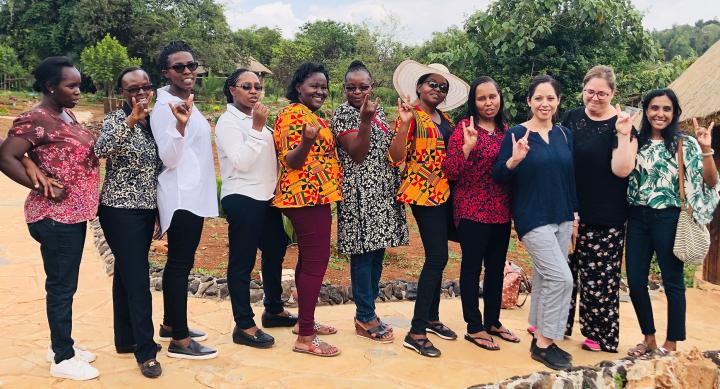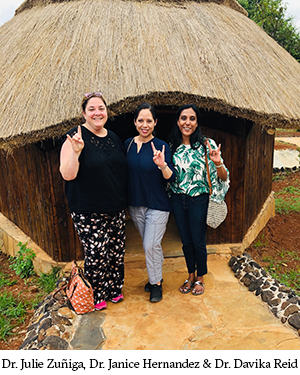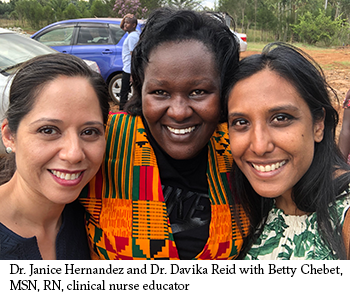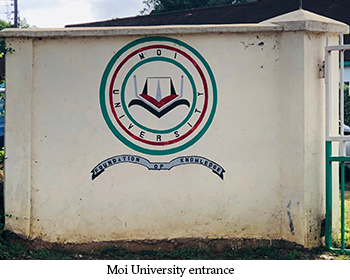
In addition to education, skills, and experience, nursing faculty need to be nimble, resourceful, and able to change directions quickly.

At least that’s what faculty members Janice Hernandez, DNP, RN, FNP-C, and Davika Reid, PhD, RN, both clinical assistant professors, and Julie Zuñiga, PhD, RN, assistant professor, discovered in early March 2020 as they headed to a conference in Eldoret, Kenya. During a layover in Doha, Qatar, they heard that the two-day conference had been cancelled owing to the COVID-19 crisis.
“We didn’t know what else to do but to continue on to Eldoret where I was to be a keynote speaker at the 2nd Annual Kenya Clinical Nurse Education Conference, and the others were also presenting,” Dr. Zuñiga said. “After we arrived, the chief nursing officer graciously organized a mini-educational exchange and asked us to present on clinical issues.”
The trip to Kenya was made possible by the President’s Award for Global Learning (PAGL) for the School of Nursing’s proposal “Using Interprofessional Education to Improve Community Health in Kenya” submitted by faculty members Alexandra Garcia, Suzanne Seriff and Julie Zuñiga. More than any other opportunity at UT Austin, the President’s Award empowers students and faculty to examine real-world challenges and enact solutions. Through a competitive process, teams of students and faculty mentors are selected to pursue interdisciplinary projects relating to international research, social impact and entrepreneurship in regions throughout the world. The School of Nursing was one of five winners of the 2019–2020 award out of 24 submissions from teams composed of 97 UT Austin students representing 11 colleges and 55 faculty members representing 12 colleges.
The School’s relationship with the Moi Teaching and Referral Hospital was initiated by the Academic Model Providing Access to Healthcare (AMPATH), a partnership between Moi University, Moi Teaching and Referral Hospital, North American universities, including UT Austin, and the Kenyan Government.
“Everyone was nice to us, but from being already on guard as countries nearby were having Ebola outbreaks, they were understandably concerned that we may have brought the COVID-19 virus with us,” Dr. Reid said. “Nevertheless, at their request, I presented on how nurse residency programs can help new nurse graduates transition to the clinical setting and also how to retain them. Even though we didn’t get to do what we had hoped to do, we built on our relationships by meeting with nurse educators at the hospital. The trip ended up being a success in a completely different way than we expected.”

The team is especially excited about the projects they are working on with their students, which have proved to be very successful. One project last year on protocols for high-risk medication administration actually decreased medication administration errors in the Kenyan hospital. Dr. Reid and one of her students in the AEMSN Leadership in Diverse Settings (LeaDS) program are currently working with a Kenyan pediatric educator to create a focused assessment tool for newly admitted pediatric patients.
As the only UT Austin faculty member on the trip with a clinical focus, Dr. Hernandez had expected to present a couple of brief poster sessions: “Use of Mid-High-Level Fidelity Simulation in Undergraduate Nursing Clinical Practicum” and “A Review Evaluation of an Undergraduate Nursing Simulation Using the Creighton Simulation Evaluation Instrument.” Instead Faith Sila, MSN, RN, clinical nurse education manager at Moi Teaching and Referral Hospital, asked her to give an in-service “Teaching and Learning” session one afternoon.
“I thought I might be talking to Faith and one or two others, but when I walked into the room, about 25 nurse leaders and staff were ready and waiting for me,” Dr. Hernandez said. “They wanted to hear about clinical education from a nurse perspective and quality improvement within the hospital. I gave a five-hour presentation on nursing education, practice, and processes related to enhancing safety, effectiveness, and efficiency in order to improve processes and patient outcomes in the hospital setting. Also discussed were ideas on how to improve nurse-student communication in the hospital setting to ensure transparency in what is expected of nursing students in clinical settings.”
Dr. Hernandez is the facilitator in the LeaDS Capstone Practicum Course and is continuing the collaboration between UT graduate students and staff at the Moi Teaching and Referral Hospital on implementing quality improvement projects.

Despite being unable to return to Kenya, the School of Nursing team has sustained the relationships and cooperation with the staff in Eldoret and maintained the mission of PAGL by weekly online meetings.
“Even though we didn’t have a lot of time, the nurses were so enthusiastic about what we were able to share with them,” Dr. Zuñiga said. “And since AMPATH wanted to strengthen the nursing presence within the AMPATH consortium, we’re hoping our team’s ability to quickly pivot to provide needful quality improvement and research skills will contribute to that.”
Dr. Zuñiga’s current research project concerns HIV self-management, and because HIV has been a big problem in Kenya, she believes the findings will make an impact there.
“We are now focusing on individuals with a dual diagnosis of HIV and diabetes and how they are self-managing during the pandemic,” she said. “Students in Austin have completed interviews with those enrolled in the HIV/diabetes project, which we’ll share with our colleagues in Eldoret and hopefully extend this research to Kenya.”
“The work the Eldoret nursing leaders and staff provide daily with very few resources is astonishing,” Dr. Hernandez said. “We were extremely fortunate to be allowed to share our nursing knowledge and expertise and can’t wait to go back.”
The following is an update on the joint project with Kenyan nurses since the COVID-19 pandemic shut borders.
Although plans to return to Kenya to continue work on their proposal “Using Interprofessional Education to Improve Community Health in Kenya” couldn’t happen in person, the team managed to keep initiatives progressing throughout 2020 and into 2021.
“We continue to partner with our colleagues in Kenya and will be testing a pediatric assessment tool in the emergency room,” Dr. Zuñiga said. “We have also submitted a manuscript for publication and are waiting to hear back about that.”
“Julie and I also collaborated with a colleague from Indiana University School of Nursing and colleagues in Kenya on a mixed-methods study to examine the effects of vicarious trauma on nurses in the U.S., Kenya, China, Mexico, and India who take care of COVID-19 patients,” Dr. Reid said. “In addition, my first dissertation publication from my study in Kenya is in press. We also had an oral presentation at the Sigma International Conference last year on our efforts to advance nursing science through our collaborative clinical, educational and research endeavors.”
Dr. Hernandez continues to facilitate the master’s-level Leadership in Diverse Settings (LeaDS) Capstone Course. “Mentorship and collaboration are an essential part of our students’ education, and I continue to oversee the partnership between LeaDS students with our colleagues at the Moi Teaching and Referring Hospital in Eldoret, Kenya, to design or implement projects to improve patient care, educate staff or patients, or improve effectiveness of health care delivery.”